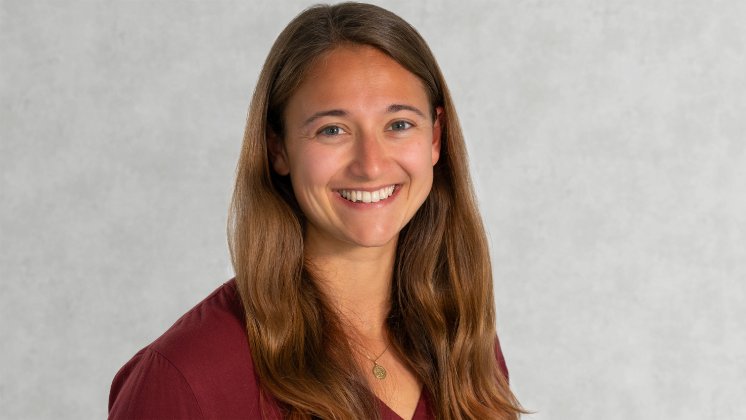Ms. Botsch, what contribution can bioeconomy make to sustainability?
Sophia Botsch: Bioeconomy is concerned with the use of green carbon, i.e. the use of raw materials from renewable sources such as residual biomass. This makes it essential for sustainable production, for example of plastics. However, other sustainability aspects, such as the greenhouse gas balance or the protection of the ecosystems required for production, must also be taken into account. For the bioeconomy to be sustainable, it requires a consistently sustainable production chain from raw material to end product.
What challenges arise when establishing bioeconomic processes in practice?
Botsch: Various solutions and products already exist, but there is no “one-fits-all” solution, which makes the further development and broad use of the processes laborious. In addition, many small-scale solutions are often not yet economically competitive. This is usually due to a lack of capital for scaling up, since, among other things, the poor networking of the individual players often means that visibility for investors is not given. However, TransBIB is a good step towards bringing together and further developing the many solutions and ideas.
What exactly is TransBIB about?
Lukas Metzger-Lindner: TransBIB aims to make the industrial transformation towards sustainable management with renewable carbons practical and part of everyday industrial life. It is essential to network the players and regions across sectors and to combine and share the often fragmented knowledge. TransBIB and its partners are divided into six application-oriented fields of action, all of which serve to accelerate the bioeconomy. For example, the “One-Stop-Shop” is designing an overview of material flows and technology infrastructures – this knowledge is to be disseminated through industry training and access to sustainability certificates is to be facilitated through a broad-based stakeholder dialog. The “Networking” team aims to link competence and model regions in the industrial bioeconomy and is also active at the EU level. TransBIB sees itself as an open network for pooling, transferring and scaling knowledge.
What is the role of SKZ in TransBIB?
Botsch: Because we are very broadly positioned at SKZ, we can also support the project in several sub-areas. On the one hand, SKZ provides knowledge in the field of bio-based value chains through its training formats to enable specialists to apply bioeconomics in the future. The motto here is “specialists creating the future”.
We are also actively involved in sorting out the confusion of certificates in the bioeconomy and creating a kind of guide to the many labels and certificates. In the first step, we are drawing a kind of map through the current jungle of certification so that SMEs in particular can prove the ecological advantage of their bio-based products and thus use them economically. The long-term goal is to standardize the certificates. For this to succeed, all stakeholders must come together and find a solution.
Certification sounds like a lot of bureaucracy – is it really necessary?
Metzger-Lindner: Yes, because there is an EU directive that prohibits general environmental claims and self-seals from 2026. That may sound bureaucratic, but it ultimately serves to protect consumers, because manufacturers will not be able to simply create their own labels that could be used to greenwash products. Accordingly, products will either have nothing on them or a truly credible seal. This also makes the certified labels more valuable and should enable consumers to make an informed decision for or against products without being misled by vague marketing statements.
The challenge here, however, is that a wide range of different labels exist in different industries, which consumers cannot compare with each other. The industries are often already intertwined because they access the same material flows. But the labels are not yet to the same extent.
How can we succeed in integrating small companies into complex bioeconomic cycles? Their resources are often very limited.
Botsch: That's exactly where certification is needed. With the appropriate certificate, smaller companies are also able to prove that their product meets bioeconomic standards. Certification therefore makes SMEs more competitive. But for SMEs in particular, the effort involved in the certification process is almost impossible to manage. This is where TransBIB wants to help by taking companies by the hand and, in the long term, further reducing the effort involved through a standardized system.
The kick-off workshop “Certification of bio-based products”, which was jointly organized by the SKZ and PIC GmbH, took place recently. How well was this first workshop received?
Metzger-Lindner: Very well. More than 40 representatives from all sectors of the bioeconomy discussed with various stakeholders of the certification process. The keynote speeches from different perspectives, including from manufacturing SMEs, certification systems and certifiers, shared their views on the respective handling of labels and best-practice examples, whereby current challenges were of course also addressed. In addition, completely different industry sectors were represented, such as the wood, plastics, agricultural and chemical industries. It became clear that, on the one hand, companies would like to see a simplified system, and on the other hand, certification systems are already beginning to recognize each other and work together. We see this development and the diverse interest as a very positive sign for future cooperation in TransBIB.
What will the next workshop be about and is it still possible to participate?
Botsch: You are very welcome to participate. The higher and more diverse the participation, the better the result. In the next workshop, we want to focus on raw materials. The aim is to exchange information about the certification requirements for bio-based raw materials. Further workshops will follow next year, focusing on processing, end products and recycling.
The workshop focusing on the certification of raw materials will take place on Thursday, October 24, 2024, at the DBFZ in Leipzig.
Registration is still possible.
The interview was conducted by Alexander Hefner from SKZ.


